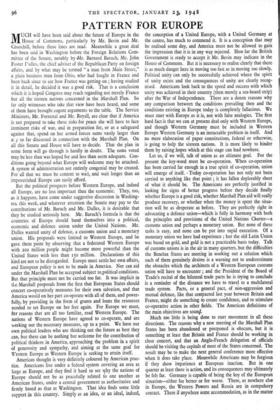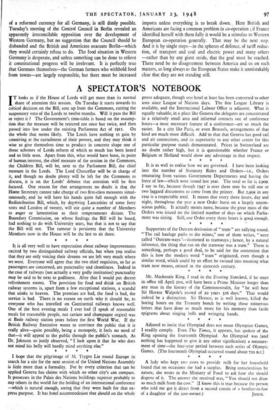PATTERN FOR EUROPE
MUCH will have been said about the future of Europe in the House of Commons, particularly by Mr. Bevin and Mr. Churchill, before these lines are read. Meanwhile a great deal has been said in Washington before the Foreign Relations Com- mittee of the Senate, notably by ,Mr. Barnard Baruch, Mr. John Foster I' ulles, the chief adviser of the Republican Party on foreign affairs, and by what may be termed " a man from Main Street," a plain business man from Ohio, who- had fought in France and been back since to see how France was getting on ; having studied it in detail, he decided it was a good risk. That is a conclusion which it is hoped Congress may reach regarding not merely France but all the sixteen nations concerned in the Marshall Plan. So far only witnesses who take that view have been heard, and some of them have brought cogent arguments to the table. The Service Ministers, Mr. Forrestal and Mr. Royall, are clear that if America is not prepared to take these risks for peace she will have to face imminent risks of war, and in preparation for, or as a safeguard against that, spend on her armed forces sums vastly larger than a: y so far discussed in connection with the Marshall Plan. On all this Senate and House will have to decide. That the plan in some form will go through is hardly in doubt. The sums voted may be less than was hoped for and less than seem adequate. Con- ditions going beyond what Europe will welcome may be attached. A system of administration not entirely congenial may be created. For all that we must be content to wait, and wait longer than an impoverished Europe can easily afford.
But the political prospects before Western Europe, and indeed all Europe, are no less important than the economic. They, too, as it happens, have come under suggestive discussion in Washing- ton this week, and whatever attention the Senate may pay to the contributions of Mr. Baruch and Mr. Dulles, it is desirable that they be studied seriously here. Mr. Baruch's formula is that the countries of Europe should band themselves into a political, economic and defence union under the United Nations. Mr. Dulles wanted unity of defence, a customs union and a monetary union. His proposals were limited to Western Europe, and he gave them point by observing that a federated Western Europe with 200 million people might become more powerful than the United States with less than 15o million. Declarations of this kind are not to be disregarded. Europe must settle her own affairs, and European policy is not to be made in America. Nor can aid under the Marshall Plan be accepted subject topolitical conditions. But that principle must not be carried too far. It was implicit in the Marshall proposals from the first that European States should concert co-operatively measures for their own salvation, and that America would on her part co-operate with all of them, and power- fully, by providing in the form of grants and loans the resources needed to set Europe on her feet again. For Europe we must, for reasons that are all too familiar, read Western Europe. The nations of Western Europe have agreed to co-operate, and are working out the necessary measures, up to a point. We have our own political leaders who are thinking out the future as best they can, but there can be nothing but welcome for the contribution of political thinkers in America, approaching the problem in a spirit of generosity. and sympathy, and aiming at the same goal for Western Europe as Western Europe is seeking to attain itself.
American thought is very definitely coloured by American prac- tice. Americans live under a federal system covering an area as large as Europe, and they find it hard to see vihy the nations of Europe should not be as peacefully related to one another as American States, under a central government as authoritative and firmly based as that at Washington. That idea finds some little support in this country. Simply as an idea, or an ideal, indeed, the conception of a United Europe, with a United Germany at the centre, has much to commend it. It is a conception that may be realised some day, and America must not be allowed to gain the impression that it is in any way rejected. How far the British Government is ready to accept it Mr. Bevin may indicate in the House of Commons. But it is necessary to realise clearly that there is as much danger here in moving too fast as in moving too slowly. Political unity can only be successfully achieved where the spirit of unity exists and the consequences of unity are clearly recog- nised. Americans look back to the speed and success with which unity was achieved in their country (then merely a sea-board strip) after the War of Independence. There are a dozen reasons why any comparison between the conditions prevailing then and the conditions existing in Europe today is completely fallacious. We must start with Europe as it is, not with false analogies. The first hard fact is that we can at present deal only with Western Europe, and though Western Germany must be included in Western Europe Western Germany is an intractable problem in itself. Arid no mere elaboration of paper constitutions, federal or otherwise, is going to help the sixteen nations. It is more likely to hinder them by raising hopes which at this stage can lead nowhere.
Let us, if we will, talk of union as an ultimate goal. For the present the key-word must be co-operation. When co-operation has been carried far enough in a true spirit of co-operation, union will emerge of itself. • Today co-operation has not only not been carried to anything like that point ; it has fallen deplorably short of what it should be. The Americans are perfectly justified in looking for signs of better progress before they decide finally whether Europe is a good risk, whether Marshall Plan aid will really produce recovery, or whether when the money is spent the situa- tion will be as desperate as before. They are perfectly right in advocating a defence union—which is fully in harmony with both the principles and provisions of the United Nations Charter—a customs union and perhaps a monetary union. But none of these tasks is easy, and none can be put into rapid execution. .Of a monetary union we have had experience ; but the old Latin Union was based on gold, and gold is not a practicable basis today. Talk of customs unions is in the air in many quarters, but the difficulties the Benelux States are meeting in working out a solution which each of them genuinely desires is a warning not to underestimate the obstacles which the architects of a Western European customs union will have to encounter ; and the 'President of the Board of Trade's recital of the bilateral trade pacts he is trying to conclude is a reminder of the distance we have to travel to a multilateral trade system. Pacts, or a general pact, of non-aggression and mutual defence, like that contiracted last year between Britain and France, might do something to create confidence, and to stimulate co-operative action in other. fields. The American definitions of the main objectives are sounil.
Much too little is being done to start movement in all these directions. The reasons why a new meeting of the Marshall Plan States has been abandoned or postponed is obscure, but it is something at least that Britain and France should be working in close concert, and that an Anglo-French delegation of officials should be visiting the capitals of most of the States concerned. The result may be to make the next general conference more effective when it does take place. Meanwhile Americans may be forgiven if they show impatience at European inaction. But in 'one quarter at least there is action, and its consequences may ultimately be felt far. Germany is capable of being the key of the European situation—either for better or for worse. There, as nowhere else in Europe, the Western Powers and Russia are in compulsory contact. There if anywhere some accommodation, as in the matter of a reformed currency for all Germany, is still dimly possible. Tuesday's meeting of the Control Council in Berlin revealed an apparently irreconcilable opposition over the development of Western Germany, but no suggestion -that the Council should be disbanded and the British and Americans evacuate Berlin—which they would certainly refuse to do. The food situation in Western Germany is desperate, and unless something can be done to relieve it constitutional progress will be irrelevant. It is perfectly true that Germans themselves—the German farmers who withhold food from towns—are largely responsible, but there must be increased imports unless everything is to break down.. Here British and Americans are facing a common problem in co-operation ; if France identified herself with them fully it would be a stimulus to Western European co-operation generally. That may be' the next step. And it is by single steps—in the spheres of defence, of tariff reduc- tion, of transport and coal and electric power and many others —rather than by any giant stride, that the goal must be reached. There need be no disagreement between America and us on such matters, so long always as the European States make it unmistakably clear that they are not standing still.































 Previous page
Previous page